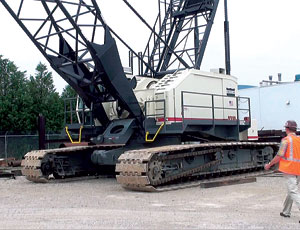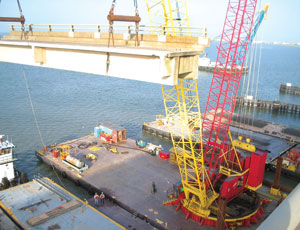Twenty years ago, Chris Traylor found himself rewiring the controls of a 225-ton, American 9310 crawler crane in his family’s equipment shop in Evansville, Ind. “It was important to my dad that all of us worked in the shop during the summers of our high-school years,” he says. Little did he know, he would be rewiring again one day, but on a much bigger scale: Now 37, the co-president of Traylor Bros. Inc. is helping to direct an ambitious fleet overhaul as the family-owned firm ramps up for a heavy workload of major U.S. infrastructure projects.

In an age when many large contractors are pushing away risk by buying less fleet, self-performing less work and leaning more on subcontractors to do the heavy lifting, well-equipped general contractors like Traylor are becoming scarcer—and thus more in demand. Traylor Bros., ranked No. 270 among ENR’s Top 400 Contractors with $272 million of revenue in 2008, also is moving into its third-generation of leadership. Chris and his brother, Mike, are taking the controls of the historic bridge, tunnel and water-infrastructure builder founded 63 years ago by their grandfather, William F. Traylor. His son, Tom, CEO, named them co-presidents in 2002.
Company insiders say Traylor is more focused than ever. In the past, “I think we probably had a plan, but it was in my father’s head,” Chris admits. “We are much more deliberate today about our corporate culture and strategic directives. Mike and I feel that this is just the best way to run a business.”
The two now are in the middle of implementing their second, five-year strategic plan, encapsulated in a one-page document which is posted near the front door of the Evansville main office. The top goal is to “ensure every team member goes home safe every day.” Others include building profit, teamwork and implementing best practices. A major initiative under way to achieve these goals is souping up the equipment fleet to meet new levels of safety and productivity. “We feel that a well-managed fleet can give you a competitive advantage,” Chris explains.
Complex projects require equipment and expert manpower—big investments that are creeping outside the comfort level of large contractors. In the past, the industry was filled with firms like Traylor, says Mike Vorster, civil-engineering professor at Blacksburg, Va.-based Virginia Tech and author of a forthcoming book, “Construction Equipment Economics.” Today, firms with armies of steel are harder to find. “Self-performing contractors, as opposed to managing contractors, are becoming fewer and fewer in numbers,” he says. “You get more and more folks who are ‘pimping’ work. It is an impolite description, but it is what they do. They take a very much lower risk, and therefore they are entitled to a very much lower reward.”
Vorster adds that companies that work above ground or on buildings tend to innovate using new materials that push new heights, while firms playing in the at-ground and underground business innovate with tools that push new depths. “I think Traylor Bros. is an outstanding example of that,” Vorster says.
Traylor’s fleet cuts through a broad spectrum of everything from small welders and mundane muck boxes to heavy-lift cranes and awe-inspiring tunnel-boring machines. The big iron works deep underground, drilling tunnels in San Diego and New York City, but also skims the water, driving sheet piling for floodwalls in brutal environments like the Gulf of Mexico, where the briny, humid air chews through paint and electrical cables.
As one can imagine, the company has many resources tied up in these machines. According to one industry estimate, Traylor’s fleet is worth $250 million in replacement value. Chris Traylor sees the math a bit differently: “It...



























Post a comment to this article
Report Abusive Comment